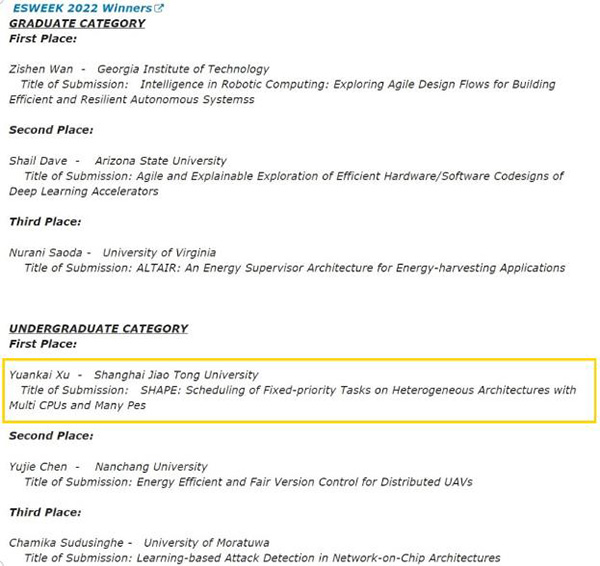The University of Michigan – Shanghai Jiao Tong University Joint Institute (UM-SJTU JI, JI hereafter) undergraduate student Yuankai Xu took a first place during a recent Association for Computing Machinery (ACM) Student Research Competition (SRC) of the Special Interest Group on Embedded Systems (SIGBED), securing him a place at the 2022 ACM Grand Finals as the only undergraduate representative of ACM SIGBED.

Xu, a junior student majoring in Electrical and Computer Engineering, attended the competition with his project “Real-time Scheduling of Fixed-Priority Tasks on Heterogeneous Architectures” under the guidance of JI Assistant Professor An Zou. After a process of two rounds including paper review and live presentation, a panel of judges from leading international universities or institutes reached consensus of offering the first place of undergraduate category to Xu. With the award, he will represent ACM SIGBED to compete with other SRC winners from different research fields in the 2022 Grand Finals. As a grand finalist, Xu and his supervisor Zou will also be invited to the Annual ACM Awards Banquet, where the Turing award is given.
ACM is the world’s largest educational and scientific computing society, uniting educators, researchers and professionals to inspire dialogue, share resources and address the field’s challenges. The 2022 ACM SIGBED SRC held in Shanghai during October 7-14, is the main student research competition in the real-time, embedded, and cyber-physical systems community with two categories including undergraduate and graduate.

Yuankai Xu joined the Efficient and High Performance Computing Lab in 2021, and has been conducting research on computer architecture under the guidance of An Zou. The competition paper “Real-time Scheduling of Fixed-priority Tasks on Heterogeneous Architectures” presents a real-time scheduling approach for general heterogeneous architectures with significant schedulability and improved utilization rate. Compared with state-of-the-art scheduling algorithms through comprehensive experiments on unified and versatile tasks, it improves the schedulability by 11.1% – 100%. Moreover, experiments performed on the NVIDIA GPU systems further indicate up to 70.9% of pessimism reduction can be achieved by the proposed scheduling. Since the work targets general heterogeneous architectures, it can be directly applied to off-the-shelf heterogeneous computing systems.
Mentor Profile

An Zou is an assistant professor and doctoral supervisor of the University of Michigan – Shanghai Jiao Tong University Joint Institute, and a young leading talent in Shanghai. His research interests include computer architecture, processor low power design, and embedded systems. Dr. Zou graduated from the Department of Electronic and Systems Engineering, Washington University in St. Louis, and received his master’s degree and bachelor’s degree from Harbin Institute of Technology. He once worked as an intern in the reality lab of Facebook and participated in the design of low-power processor chip for Oculus VR glasses. As a major contributor, he has presided over and participated in many research projects of National Natural Science Foundation of China, National Natural Science Foundation of America, Semiconductor Research Association of America and Industrial Companies. Several works have been published in top conferences and journals on architecture and circuit systems such as MICRO, DAC, ICCAD, TCAD, TACO, and RTAS, winning DAC 2017 and MLCAD 2020 Best Paper Nomination Awards. He is currently a member of the Program Committee for DAC, PACT, ISCAS and other top conference in the field, and a member of the CCF Special Committee on Embedded Systems.
Efficient and High Performance Lab
The main research direction of the lab’s research group is computer architecture, including low power design of processor, real-time scheduling of heterogeneous computing processor, design of artificial intelligence hardware accelerated chip and privacy protection. Lab website: https://sites.ji.sjtu.edu.cn/zouan.

